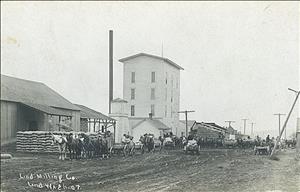On February 4, 1902, the incorporation of Lind as a town of the fourth class takes effect when a certified copy of the Adams County commissioners' order incorporating the town is filed in the Washington Secretary of State's office. The citizens of Lind, located in the middle of the dryland wheat country of Adams County, had voted in favor of incorporation, by a margin 57 votes to 3, in an election held on January 25. The Adams County Board of Commissioners confirmed the election results on January 27 and entered an order incorporating the town on January 29.
The Path to Incorporation
Lind was established as a station at milepost 79 on the Northern Pacific Railway line in 1881. Homesteaders began settling in the area around the station in 1886. Charles Jell became Lind's first postmaster on November 13, 1886. Brothers Dugal (1860-1906) and James (1861-1938) Neilson platted the town of Lind on June 7, 1890. When Judson J. Merriman (1855-1924) became the third postmaster, a new post office was built on May 9, 1898. The town had been named and platted but was not yet incorporated.
In early 1902, Lind residents decided they wanted to organize a municipal government and incorporate their community. By then, businesses in the community included grocery stores, saloons, real-estate offices, hotels, restaurants, livery stables, blacksmith shops, harness shops, and grain warehouses, along with a bank, furniture store, hardware store, drugstore, meat market, jewelry store, doctor's office, and a newspaper. There were two schools, three churches, and a cemetery.
An election was held on Saturday, January 25, 1902, to vote on incorporating Lind as a town of the fourth class. An estimated 463 inhabitants lived within the boundaries of the proposed town. The results of the election were overwhelmingly in favor of incorporation. When the votes were tallied, the proposal passed with 57 votes in favor and just three opposed.
Two days later on Monday, January 27, the Adams County Board of Commissioners met at the courthouse in Ritzville to count the votes. On January 29, the board entered an order recording that vote and incorporating the town of Lind. Lind was officially incorporated as a town of the fourth class on February 4, 1902, when the board's order was filed in the Secretary of State's office.
Lind's First Elected Officers
In the same election that approved the incorporation, voters elected the new town's first officers. Early settler Dugal Neilson was elected mayor, and his brother James Neilson was chosen as town treasurer. and August Boenig town clerk. Elected to form the first town council were Joe M. Moulton, August Boenig, Sylvester L. Van Marter (1863-?), Hugh D. Dunlap, and Charles H. Low. Unsuccessful candidates, receiving a scattering of votes, included Judson Merriman, E. B. Lincoln, W. G. Offutt, R. F. Simmons, and J. W. Henderson.
Dugal (or Dougal) Neilson, Lind's first mayor, was born in Ontario, Canada. He moved to Sacramento, California, and lived there for eight years. Dugal moved to Lind with his brother James in 1888. In the fall of 1897 he was elected assessor of Adams County, serving from January 1898 to January 1900. Dugal did not serve as Lind's mayor for long, resigning his position on May 28, 1902. He was replaced by Joe Moulton. Neilson never married nor had children.
On February 1, 1902, three days before Lind's incorporation became official, the new council met in a special session, with the participants identified in the minutes as "mayor-elect," treasurer-elect," and "councilman-elect" because they did not yet actually hold the offices. The members introduced and discussed several proposed ordinances for the new town, each of which was "laid over until first regular meeting" on February 6 (Minutes, February 1, 1902). The ordinances considered included ones that would set a place and time for council meetings, provide the amount of bonds to be given by certain town officers, define disorderly persons and fix penalties, define and prescribe punishment of misdemeanors, license hackers and peddlers, and license liquor. On February 6, two days after Lind was officially incorporated, the council held its first regular meeting and enacted the ordinances discussed in the special session.

